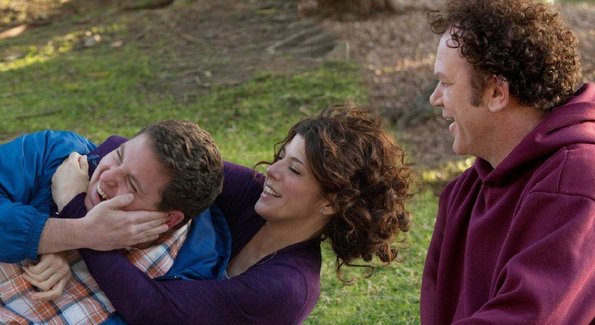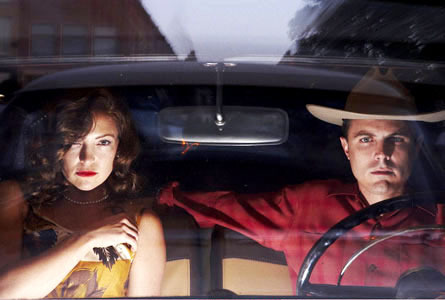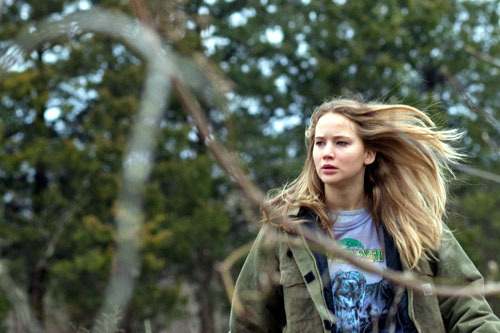Fri 25 Jun 2010
Quick Picks
Posted by Ethan under Film Review, NYC Film Critic
Comments Off on Quick Picks
Brief takes on four films currently in theaters.
Cyrus
Written and Directed by Jay Duplass and Mark Duplass
Starring John C. Reilly, Jonah Hill, Marisa Tomei, Catherine Keener and Matt Walsh
**1/2
The plot outline for Cyrus sounds like the set-up for a solid Saturday Night Live sketch. What if a schlubby loser somehow started dating a smokin’ single lady? But wait, here’s the twist: her creepy grown-up kid still lives at home and he isn’t about to let some new guy put the moves on his beloved mama. Cast Jason Sudeikis as the guy, Kristen Wiig as the girl and Will Forte as the kid, get one of the Lonely Island guys to write it and you should have a decent five-minute skit. Unfortunately, the Duplass Brothers—a pair of filmmakers at the forefront of the so-called “mumblecore†school of independent film, now making their first studio picture—attempt to hang an entire feature around this ultra-thin premise. That they almost succeed is due entirely to the excellent cast that the Duplass boys have assembled, starting with stellar character actor and skilled comedian John C. Reilly as a sad-sack divorcee whose attempts to start a serious romance with a lovely single mom (Marisa Tomei) are repeatedly thwarted by her overly dependent twentysomething son Cyrus (Jonah Hill). Watching Hill and Reilly lock horns is almost worth the price of admission, but there’s an awful lot of filler before their epic battle of wills begins in earnest. Meanwhile, just like in The Wrestler, Tomei struggles to make the most of a severely underwritten role, trying to find some dimension to a character that largely exists as a fantasy object for the male leads. I respect the Duplass Brothers for the kind of comedy they’re trying to make—one where the humor emerges from observing behavior rather than dictating it by forcing the characters into a series of broadly comic situations. But at the end of the day, the characters’ behavior in Cyrus simply wasn’t interesting or funny enough to really hold my attention. It may have indie cred, but the movie feels as slight and forgettable as one of Adam Sandler’s big studio-produced comedies.
———————————————————————————————————————————
I Am Love
Directed by Luca Guadagnino
Written by Luca Guadagnino, Barbara Alberti, Ivan Cotroneo, Walter Fasano
Starring Tilda Swinton, Flavio Parenti, Edoardo Gabbrielini
***1/2
So far, Luca Guadagnino’s florid love story ranks as this summer’s second-best spectacle-driven entertainment (after Toy Story 3). The visual fireworks here come not from explosion-heavy action sequences, but lush cinematography, elegant compositions and above all, Tilda Swinton’s commanding, almost regal presence as the reserved matriarch of a prosperous Italian family. The film’s plot is the stuff of classic melodrama: following the death of world-renowned textile merchant Edoardo Recchi Sr., control of the family business passes to his son Tancredi and grandson Edoardo Jr. While Tancredi has been preparing for this day his whole life, his son is more interested in pursuing a career in the restaurant business having befriended a promising young chef named Antonio. After a few chance encounters with this handsome culinary genius, Emma Recchi (Swinton), Tancredi’s wife and Edoardo Jr.’s mother, throws herself headlong into a passionate love affair that, if discovered, would certainly lead to her ruin. But after devoting much of her life to directing the daily routine of the lavish Recchi household, Emma longs to be free of that gilded cage, finding ways to spend days at a time at Antonio’s rustic home in a small mountain village. The “bird in a cage†metaphor is referenced quite literally in the film, with Guadagnino repeatedly incorporating shots of various doors in the Recchi mansion closing on Emma, keeping her confined indoors. (Fortunately, not all of the movie’s themes are expressed quite so blatantly.) I Am Love is at its best in its second act, when Emma and Antonio first embark on their affair and her son fights to preserve the Recchi empire from his father’s attempts to sell it to foreign investors. After the heightened emotions and backstage intrigue of this section, the movie’s dénouement is somewhat disappointing, side-stepping richer storytelling possibilities for a more standard—if still compelling—resolution. Through it all, Swinton delivers a beautifully nuanced and endlessly surprising performance, one that confirms her status as one of contemporary cinema’s premiere acting talents.
———————————————————————————————————————————
The Killer Inside Me
Directed by Michael Winterbottom
Screenplay by John Curran
Starring Casey Affleck, Jessica Alba, Kate Hudson
***
I haven’t had the chance to re-watch Michael Winterbottom’s controversial tale of a small-town Texas cop with dubious morals since reading the equally controversial book by Jim Thompson, but going back to the novel has helped me more clearly distinguish between what I felt worked in the movie and what didn’t. In the former category, my list starts with Casey Affleck’s sly turn as Lou Ford, the sanity-challenged lawman who happily twists the law to serve his own ends. Thompson’s book is tricky to adapt because it puts the reader deep into the main character’s rattled, uneasy mind, something that a movie can’t do quite as effectively. In fact, Winterbottom is forced to fall back on one of my least favorite devices—voiceover narration—and only gets away with it because Affleck’s delivery is so chillingly amusing, which contrasts nicely with his reserved, almost placid physical performance. I also think that the film version nails the banality of small-town life Thompson describes in his book as well as Lou’s shocking outbursts of violence. Those scenes were the ones that got the movie in trouble at Sundance and they are quite graphic and hard to watch. At the same time though, the charge that Winterbottom is glamorizing or condoning Lou’s actions strikes me as wrong-headed. He’s presenting the violence in the same stark tone that Thompson employs on the page. And the truth is, most screen violence seen today is either bloodless—The A-Team, Prince of Persia—or so exaggerated you can’t take it seriously—Saw, Inglorious Basterds—which makes the bloodletting here that much more intense and upsetting. Where the film falls short of its source material is in the casting of the supporting roles (both Jessica Alba and Kate Hudson are entirely unconvincing as Lou’s two lovers and victims, while Elias Koteas and Bill Pullman chew the scenery with far too much relish) and a confusing shift into fantasy in the closing moments. (In the book, Lou vanishes more and more into his own mind as the story unfolds, a progression that the movie attempts to follow with far less success.) Winterbottom may have set himself up for failure by attempting to stay true to both the spirit and the letter of the novel—most adaptations wisely strive to follow the former rather than the latter—but that central flaw is also what makes his movie so interesting to study. I’d almost recommend turning the sound off and reading Thompson’s book aloud while watching the movie, to see how carefully Winterbottom crafted the images to fit the text.
———————————————————————————————————————————
Winter’s Bone
Directed by Debra Granik
Written by Debra Granik and Anne Rosellini
Starring Jennifer Lawrence, John Hawkes and Kevin Breznahan
***
Already described, not incorrectly, as “rural noir†the Ozarks-set mystery Winter’s Bone possesses all the hallmarks of a Raymond Chandler or Dashiell Hammett yarn from the bad old days of Los Angeles. As in those gritty tales of intrigue and murder, there’s a hard-boiled hero (a resourceful 17-year-old named Ree–wonderfully played by newcomer Jennifer Lawrence–who takes care of her invalid mother and two younger siblings), a missing person (Ree’s deadbeat dad, who put their house up as collateral for his bail bond, which means the family will be thrown out if he doesn’t reappear before his court date) and a host of hostile suspects (Ree’s supposed friends and neighbors, all of whom have their own reasons for making sure her father stays lost). But instead of the rain-swept streets of Hollywood, this case unfolds in the deep, desolate woods of Missouri, where families like Ree’s do their best to eke out a living. Co-writer/director Debra Granik does an excellent job establishing the unofficial laws that this community abides by. It’s made very clear, for example, that while the men waste their time drinking, fighting and cooking up crystal meth, their wives and daughters are left to actually run things…within limits of course. (The women may be responsible for earning money, paying the bills and putting food on the table, but they’re still not supposed to challenge a man’s authority.) To be honest, the details of the world that Ree inhabits interested me far more than the mystery she’s attempting to solve. As she grew closer to finding her father, I grew more disengaged from the movie’s narrative. If Winter’s Bone ultimately falls short for me as a variation on a classic detective story, it succeeds as a window into a place and way of life that I’ve rarely seen depicted onscreen before.





No Responses to “ Quick Picks ”
Sorry, comments for this entry are closed at this time.